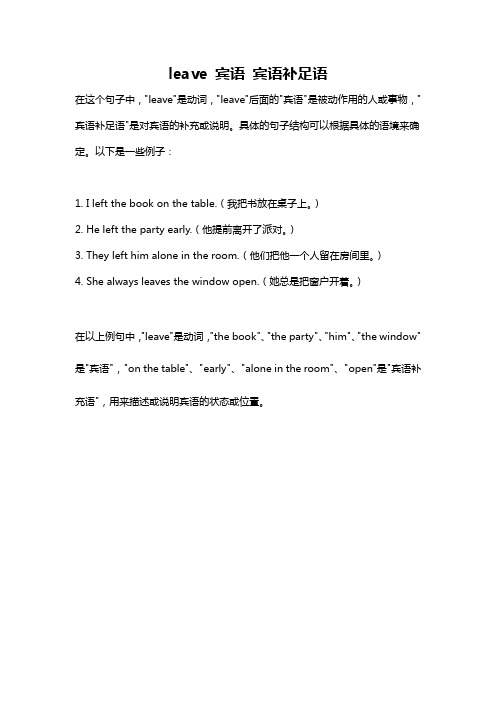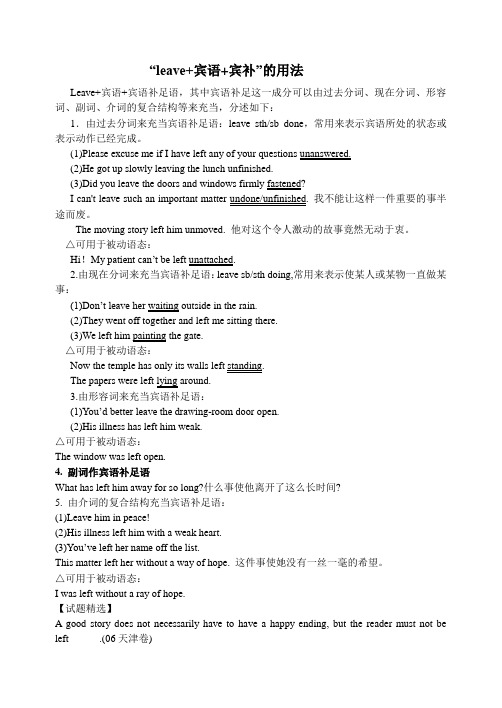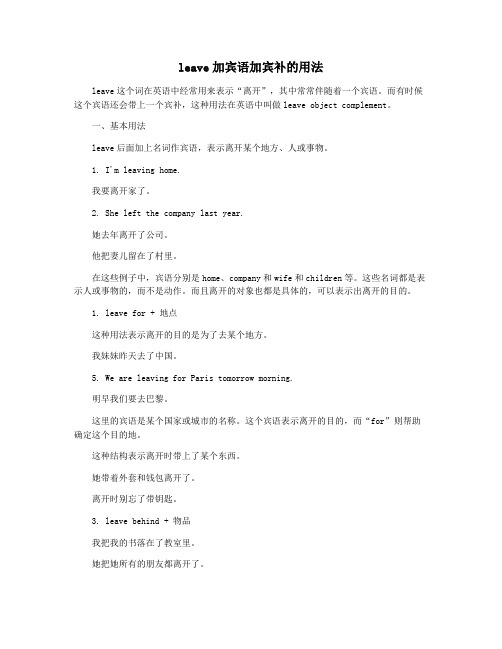leave宾语宾补的用法
leave 宾语 宾语补足语

leave 宾语宾语补足语
在这个句子中,"leave"是动词,"leave"后面的"宾语"是被动作用的人或事物,"宾语补足语"是对宾语的补充或说明。
具体的句子结构可以根据具体的语境来确定。
以下是一些例子:
1. I left the book on the table.(我把书放在桌子上。
)
2. He left the party early.(他提前离开了派对。
)
3. They left him alone in the room.(他们把他一个人留在房间里。
)
4. She always leaves the window open.(她总是把窗户开着。
)
在以上例句中,"leave"是动词,"the book"、"the party"、"him"、"the window"是"宾语","on the table"、"early"、"alone in the room"、"open"是"宾语补充语",用来描述或说明宾语的状态或位置。
leave复合结构

leave + 宾语 + 宾补 宾补:n./adj./ adv./介词短语/小三(done, doing, to do)
意思:“使.....处于…..状态;听任;让”
6. leave sth/sb 介词短语,让....处于...状态 eg. 让他静静地待着吧。 Leave him in peace. 7. leave sth/sb n.(名词),给....留下... eg.她老公给她留下一大笔钱。 Her husband left her a large amount of money.
目录
小试牛刀
leave + 宾语 + 宾补 宾补:n./adj./ adv./介词短语/小三(done, doing, to do)
意思:“使.....处于…..状态;听任;让”
1. I can't leave such an important matter undone (do). 2. My parents went out to see a film, leaving (leave) me
C. being run
D. to run
THANK YOU
leave + 宾语 + 宾补 宾补:n./adj./ adv./介词短语/小三(done, doing, to do)
意思:“使.....处于…..状态;听任;让”
4. leave sth/sb adj,让....处于...状态 eg. 让窗户开着吧。 The window was left open. 5. leave sth/sb adv,让....处于...状态 eg.我们不能人走灯不灭。 We can’t leave the light on when leaving.
leave的六种宾补结构

leave的六种宾补结构Leave的六种宾补结构Leave是一个常用的动词,它可以用来表示离开某个地方或情况。
在句子中,leave可以带有宾补结构,用来进一步说明离开的方式、目的或结果。
本文将介绍leave的六种常见宾补结构,分别是leave sb. + adj., leave sb. + n., leave sb. + to do sth., leave sb. + v.-ing, leave sb. + adv. 和 leave sb. + prep. phrase。
一、leave sb. + adj.(使某人处于某种状态)这种结构表示离开后留下某人处于某种状态,常用于描绘情感或心理状态。
例如:1. I was deeply moved by the movie. It left me speechless.(那部电影让我深受感动,让我无言以对。
)2. The news of her promotion left me envious.(她晋升的消息让我羡慕不已。
)二、leave sb. + n.(使某人处于某种状态)这种结构表示离开后留下某人处于某种状态,常用于描述具体的情况或感受。
例如:1. The loud noise left me with a headache.(那嘈杂的声音让我头疼不已。
)2. The unexpected rainstorm left us in a mess.(突如其来的暴雨让我们一片混乱。
)三、leave sb. + to do sth.(让某人去做某事)这种结构表示离开时将某人交给他人或自己去做某事。
例如:1. My boss left me to handle the project on my own.(我的老板让我自己负责处理这个项目。
)2. She left her children to play in the park while she went shopping.(她让孩子们在公园里玩耍,自己去购物。
leave+宾语+宾补

• 公式六.leave +宾语+ 名词 • The earthquake left him an orphan. • 公式七:leave +宾语+不定式 • She left her mother to take care of her baby.
_l_ea_v_e_the windows c_l_o_se_d____(让窗子关着)
• 2. Don’lte_a_v_e___himw_a_i_ti_n_g_(等着)outside in
the train.
• 3.He would like to l_e_av_e__the apple _u_n_e_a_te_n(未 吃完的)up and threw away.
• (1)Don’t leave her waiting outside in the rain. • (2)They went off together and left me sitting
there. • (3)We left him painting the gate. • They all waked out and left me sitting there all by
• A.leaving, unlocked B. leaving, unlocking
• C. left, unlocked D. to leave, unlocking
• 4. Don’t leave the water _A____ while you brush your
teeth. A. running
leave作为使役动词用时 leave +宾语+ 宾补
leave+宾语+宾补的用法

The movingstory left himunmoved.他对这个令人激动的故事竟然无动于衷。
2.由现在分词来充当宾语补足语:leave sb/sth doing,常用来表示使某人或某物一直做某事(宾语和宾补被动关系).
3.由形容词来充当宾语补足语:
(1)You’dbetter leavethe drawing-room dooropen.
(2)Hisillnesshaslefthimweak.
△可用于被动语态:
Thewindow wasleft open.
4.由副词作宾语补足语
(1)What haslefthimawayfor so long?什么事使他离开了这么长时间?
3.John rushed outin a hurry,______the door _______.
A.leaving, unlocked B. leaving, unlocking C.left,unlockedD.toleave, unlocking
4.Don’tleave the water______ whileyou brushyour teeth.
△可用于被动语态:
I wasleftwithout a ray of hope.
5.由名词作宾语补足语
The earthquakelefthim an orphan.
【试题精选】
1.Agoodstorydoes notnecessarilyhavetohaveahappyending,but thereadermust notbe left______.(06天津卷)
leave宾语宾补的用法

“leave+宾语+宾补”(即leave复合结构)的用法总结Leave+宾语+宾语补足语,其中宾语补足语这一成分可以由过去分词、现在分词、形容词、副词、介词的复合结构等来充当,意思是”使.....处于…..状态;听任;让”现分述如下:1.由过去分词来充当宾语补足语:leave sth/sb done,常用来表示宾语所处的状态或表示动作已经完成。
(宾语和宾补被动关系)(1)He got up slowly, leaving the lunch unfinished.(2)Did you leave the doors and windows firmly fastened?(3)I can't leave such an important matter undone/unfinished. 我不能让这样一件重要的事半途而废。
The moving story left him unmoved. 他对这个令人激动的故事竟然无动于衷。
2.由现在分词来充当宾语补足语:leave sb/sth doing,常用来表示使某人或某物一直做某事(宾语和宾补被动关系).(1)Don’t leave her waiting outside in the rain.(2)They went off together and left me sitting there.(3)We left him painting the gate.△可用于被动语态:The papers were left lying around.3.由形容词来充当宾语补足语:(1)You’d better leav e the drawing-room door open.(2)His illness has left him weak.△可用于被动语态:The window was left open.4.由副词作宾语补足语(1)What has left him away for so long?什么事使他离开了这么长时间?(2)We can’t leave the light on when leaving.5. 由介词的复合结构充当宾语补足语:(1)Leave him in peace!(2)His illness left him with a weak heart.(3)You’ve left her name off the list.(4)This matter left her without a way of hope. 这件事使她没有一丝一毫的希望。
leave+宾语+宾补

“leave+宾语+宾补”的用法Leave+宾语+宾语补足语,其中宾语补足这一成分可以由过去分词、现在分词、形容词、副词、介词的复合结构等来充当,分述如下:1.由过去分词来充当宾语补足语:leave sth/sb done,常用来表示宾语所处的状态或表示动作已经完成。
(1)Please excuse me if I have left any of your questions unanswered.(2)He got up slowly leaving the lunch unfinished.(3)Did you leave the doors and windows firmly fastened?I can't leave such an important matter undone/unfinished. 我不能让这样一件重要的事半途而废。
The moving story left him unmoved. 他对这个令人激动的故事竟然无动于衷。
△可用于被动语态:Hi!My patient can’t be left unattached.2.由现在分词来充当宾语补足语:leave sb/sth doing,常用来表示使某人或某物一直做某事:(1)Don’t leave her waiting outside in the rain.(2)They went off together and left me sitting there.(3)We left him painting the gate.△可用于被动语态:Now the temple has only its walls left standing.The papers were left lying around.3.由形容词来充当宾语补足语:(1)You’d better leave the drawing-room door open.(2)His illness has left him weak.△可用于被动语态:The window was left open.4. 副词作宾语补足语What has left him away for so long?什么事使他离开了这么长时间?5. 由介词的复合结构充当宾语补足语:(1)Leave him in peace!(2)His illness left him with a weak heart.(3)You’ve left her name off the list.This matter left her without a way of hope. 这件事使她没有一丝一毫的希望。
leave加宾语加宾补的用法

leave加宾语加宾补的用法leave这个词在英语中经常用来表示“离开”,其中常常伴随着一个宾语。
而有时候这个宾语还会带上一个宾补,这种用法在英语中叫做leave object complement。
一、基本用法leave后面加上名词作宾语,表示离开某个地方、人或事物。
1. I'm leaving home.我要离开家了。
2. She left the company last year.她去年离开了公司。
他把妻儿留在了村里。
在这些例子中,宾语分别是home、company和wife和children等。
这些名词都是表示人或事物的,而不是动作。
而且离开的对象也都是具体的,可以表示出离开的目的。
1. leave for + 地点这种用法表示离开的目的是为了去某个地方。
我妹妹昨天去了中国。
5. We are leaving for Paris tomorrow morning.明早我们要去巴黎。
这里的宾语是某个国家或城市的名称。
这个宾语表示离开的目的,而“for”则帮助确定这个目的地。
这种结构表示离开时带上了某个东西。
她带着外套和钱包离开了。
离开时别忘了带钥匙。
3. leave behind + 物品我把我的书落在了教室里。
她把她所有的朋友都离开了。
这个宾补可以是一个具体的物品,也可以是一个抽象的概念。
有时候,leave后面还可以加上一个形容词,表示离开时的状态或某种感觉。
我离开时感到很生气。
四、leave加动词不定式的用法我的朋友离开了,去坐火车。
我要离开了,开始新的生活。
这个宾补通常是动词的原形形式,这样可以准确传达出离开的目的或者愿望。
总结leave加宾语加宾补的用法比较灵活,可以根据不同的语境来做出调整。
在表达的过程中,需要注意宾语的类型、目的地、带上的物品、留下的物品,还有离开的状态和意愿等等。
只要掌握好这些要点,就可以很好地运用这种结构,用简洁而准确的语言来传达我们的意思。
- 1、下载文档前请自行甄别文档内容的完整性,平台不提供额外的编辑、内容补充、找答案等附加服务。
- 2、"仅部分预览"的文档,不可在线预览部分如存在完整性等问题,可反馈申请退款(可完整预览的文档不适用该条件!)。
- 3、如文档侵犯您的权益,请联系客服反馈,我们会尽快为您处理(人工客服工作时间:9:00-18:30)。
“leave+宾语+宾补”(即leave复合结构)的用法总结Leave+宾语+宾语补足语,其中宾语补足语
这一成分可以由过去分词、现在分词、形容词、副词、介词的复合结构等来充当,意思是”使.....处于…..状态;听任;让”现分述如下:
1.由过去分词来充当宾语补足语:leave sth/sb done,常用来表示宾语所处的状态或表示动作已经完成。
(宾语和宾补被动关系)
(1)He got up slowly, leaving the lunch unfinished.
(2)Did you leave the doors and windows firmly fastened?
(3)I can't leave such an important matter undone/unfinished. 我不能让这样一件重要的事半途而废。
The moving story left him unmoved. 他对这个令人激动的故事竟然无动于衷。
2.由现在分词来充当宾语补足语:leave sb/sth doing,常用来表示使某人或某物一直做某事(宾语和宾补被动关系).
(1)Don’t leave her waiting outside in the rain.
(2)They went off together and left me sitting there.
(3)We left him painting the gate.
△可用于被动语态:
The papers were left lying around.
3.由形容词来充当宾语补足语:
(1)You’d better leav e the drawing-room door open.
(2)His illness has left him weak.
△可用于被动语态:
The window was left open.
4.由副词作宾语补足语
(1)What has left him away for so long?什么事使他离开了这么长时间?
(2)We can’t leave the light on when leaving.
5. 由介词的复合结构充当宾语补足语:
(1)Leave him in peace!
(2)His illness left him with a weak heart.
(3)You’ve left her name off the list.
(4)This matter left her without a way of hope. 这件事使她没有一丝一毫的希望。
△可用于被动语态:
I was left without a ray of hope.
5.由名词作宾语补足语
The earthquake left him an orphan.
【试题精选】
1.A good story does not necessarily have to have a happy ending, but the reader must not be left______.(06天津卷)
A.unsatisfied
B.unsatisfying
C.to be unsatisfying D.being unsatisfied
2. His remarks left me ______ about his real purpose.
A. wondered
B. wonder
C. to wonder
D. wondering
3. John rushed out in a hurry, ______ the door _______.
A.leaving, unlocked
B. leaving, unlocking
C. left, unlocked
D. to leave, unlocking
4. Don’t leave the water ______ while you brush your teeth.
A. running
B. run
C. being run
D. to run
答案:A D A A。
